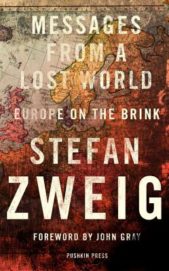 Stefan Zweig
Stefan Zweig
Pushkin Press ($25)
by Jesse Freedman
If ever there was an ambassador for Europe, an apostle for its culture and values, that man must have been Stefan Zweig. Born in Vienna in 1881, Zweig emerged during the interwar period as one of the continent’s foremost intellectuals, writing on topics ranging from art and identity to history and politics. Often, his essays read as a celebration, a paean to European achievement in the early twentieth century. Zweig’s works are filled with a profound appreciation not only for his native Austria, but for Italy and France, and for their shared contributions to what he labeled the “magnificent common edifice” of European culture. Zweig’s essays, including several translated into English for the first time in Messages from a Lost World, amount to songs of progress, bursting as they are with pride and fraternity.
Underlying Zweig’s conception of the world—of politics, economics, and culture—was an assumption of European superiority. Zweig intended this not in a racial sense, but rather as an homage to what he considered a process of continued intellectual refinement. He wrote, for instance, of a “unanimous inflaming” of the European imagination, arguing that its history had been endowed with the epic qualities first articulated by the early Greek poets. For Zweig, Europe’s past was cloaked in grandeur and civility, and was populated with great men. There could be nothing better, he maintained, than the artistic awakening of the Renaissance or the philosophical foment of the Enlightenment. Titian, Machiavelli, Calvin, and Locke: these sons of Europe were shared property, and all of the continent’s children—including its Jewish children like Zweig—could rightly claim ownership to the gifts they’d imparted.
While Zweig praised European history—going so far in 1931 as to describe it as “a heroic hymnal poem to unity”—he did so with an awareness that there were cracks at its seams. Events had conspired against Zweig in 1914, and now, as Europe entered the height of the interwar years, he sensed that same nervous energy. For Zweig, there could be nothing worse than war. Armed conflict promised mass destruction: the First World War, he wrote, would be a battle of “everyone against everyone.” That, of course, turned out to be true, but for Zweig it was far worse: the horror of total war threatened the “old order of life,” the vision of Europe he’d worked so diligently to uphold.
It’s here, in that dark space between Zweig’s love for Europe and his regret for its intractable march toward war, that Messages from a Lost World exposes the prescience and humanity for which Zweig has come to be known. In several essays, Zweig anticipates, for instance, a European union, a proto-state built on the idea of mutual cooperation. Like the League of Nations proposed at the end of the First World World, Zweig’s union sought to harness what he called a “supranational consciousness.” In the end, such attempts at union—and reunion—were foiled, and it’s as the Second World War approaches that Zweig’s songs of progress are transformed into lamentations.
That Zweig was unable to restore order by way of his writing (and the intellectual tradition of which that writing was a part) must have cut him to the core. His regard for civilization—which he defines as “humanity managed according to moral principle”—crumbled under the strain of war. Interestingly, however, it’s not to Germany alone that Zweig assigns blame. His disappointment focuses instead on the inability of European nations to overcome the temptation of conflict, to pursue moderation in the face of extremism. Zweig was perhaps most unnerved in 1934 when questioning the benefits of nationalism. “The European idea,” he wrote, “is not a primary emotion like patriotism or ethnicity; it is not born of a primitive instinct, but rather of perception . . . of a more elevated way of thinking.” Zweig feared what he called “spontaneous fervour.” In it, he identified a potential for the collective to come undone, and for old hatred and prejudice—including for Jews—to reemerge.
World War I had left Europe with a dangerous legacy: a form of state-sponsored propaganda in which language itself became perverted. Of those politicians who might exploit this propaganda, Zweig offers a pointed critique, labeling them as bellicose and bitter, with a “perennial taste for violence and hatred.” Zweig turns repeatedly when discussing European politics to the Tower of Babel, writing as early as 1916 (and again as late as 1939) of a nightmarish version of the continent in which people cannot converse, in which an omniscient power has removed the ability to communicate. This is an image that haunts Zweig, precisely because it’s one in which individual nations—as opposed to the collective—reach for the “eternal.” Without mutual intelligibility, he argues, Europe is nothing.
Before his suicide in 1941, Zweig returned in his writing to the Vienna of his youth. In it, he described the city’s “life force.” This, he maintained, was what was at stake in World War II: the ability of citizens to create freely, and to advance the shared heritage that made them European. Ultimately, Zweig and his wife, Lotte, succumbed to the darkness of war, but not before setting a course for those who remained. The purest form of history, wrote Zweig, charted the “relentless ascension to an ever more noble state of humanity.” That path is a noble one, indeed. With the crises swirling around Europe today, we’d do well to remember Zweig’s vision.
